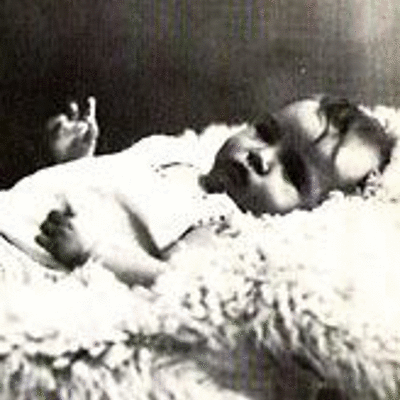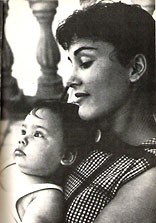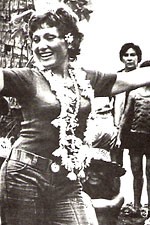


 |
 |
 |


When Rika was born, on february the 19th 1938, in Jerusalem , second child of a family of jewish settlers, Israel was still called Palestine, and over in europe, the holocaust was already starting
She would never know her mother's family as all of them were killed in Auschwitz.
Shula, her mother, was of Polish descent, and would have liked to have become a doctor in medicine. But she had to leave medical school when the Jewish persecutions started. As an athlete, she went to Palestine to enter some sporting competitions, and it is at this time that she met Rika's father and decided to settle and stay there. She would never see her family again....
Eliezer Gozman, Rika's father, came from a very
poor miller’s family from Russia. As a committed Zionist, he
decided, aged 13, to leave Russia and his family, and he walked to the
Promised
Land. He reached it 8 months later! He only spoke Yiddish and
worked at drying up swamps so that Jewish communities could have land
to settle on. He worked there for many years, but
studied at the same
time, and finally became, many years later, an electronics engineer,
setting up Israel's aerial and radio networks.
So, it was in a time of great sadness and anguish for the Jewish community the world over, that Rika came to be born...
Life was hard for the Gozman family, but Shula, the
mum, was an energetic spirited woman, who despite the personal dramas,
lead her household with much strength. If money lacked, she
nevertheless always managed to put food on the table; as for the rest,
they sometimes had to do without! Frustrated that she never, herself,
got to finish her studies, Mrs. Gozman expected
from her children, that
they attain the best results. Also, as she thinks that playing an
instrument is part of a good education, Rika started, age 7, learning
the piano at Jerusalem's Music School, from which she would win the
First Prize at age 15, as well as obtaining brilliant results at school.
Aged 17, Rika left home to go to military service for the next two and a half years. Her musical knowledge was noticed and she was soon appointed musical director for the Arts group of her Army center. And when the Army decided to set up a musical show, "Five out of Five", about the love story of two young soldiers, Rika was chosen to supervise the rehearsals. Israel is a small country where civil and military lives are very much linked, and as the show toured, it became a success. The songs were written by Johann Zaraï and soon become huge hits. With such popular praise, the Army gets in touch with a Jerusalem theatre producer. It so happens that the young singer with the leading role, a young woman soldier, was sent on a military mission, and a replacement had to be found right away. Since Rika was a seasoned musician and already knew all the songs from having organized the show's rehearsals, she was put forward to take on the part, and, bowled over by her voice and enthusiasm, the producer gave her the lead without any hesitation.
This is therefore how, overnight, she became, at 19 and a sergeant major in the army, a variety singer, and not a classical musician like her mother would have hoped. Meanwhile, Rika also fell in love with Johann Zaraï, married him in 28/07/1953, and gave birth to their daughter Yaël, on September the 11th, 1957.
Following the musical's triumph, and after her first taste of public praise, she decided that singing was her choice of career. She started performing in cabarets and theatres, singing songs translated from French classicTo her, a young budding Israeli singer, who so admired French music, it was truly a dream come true! The producer told her to go and see Bruno Coquatrix on his behalf, and, on that one recommendation, she decides to leave for Paris and for glory, with her child, still a baby, a return ticket, and 100 US$....
 |
 |
 |
| In the military | Starting out in Israël | With her baby girl, Yaël |
She only spoke English and Hebrew. She had thought that English was universally spoken, but soon realized that it wasn't, when she arrived in France! She met countless difficulties with the secretaries of the Olympia theatre, but her stubbornness finally pays off and she obtains an audition with Bruno Coquatrix, its famous director. She sings to him, songs in Hebrew from her repertory, and tells him candidly: "My name is Rika Zaraï, I just arrived from Israel, and Mr. So-And-So told me to come and see you to give me a job in your theatre ". Coquatrix is stunned that she had left her homeland on the say-so of some pretend-producer, and tells her: "Come back to see me when you can sing in French ". Rika, who had left her husband, therefore found herself alone with a small child to feed and care for, and no job prospect, in a country in which she didn’t understand or speak the language. It was a very difficult time for her, and to survive, she sang in strip bars and brothels in Belgium and Germany. She released a first record with Acropole Productions, with four songs in Hebrew, but that didn’t achieve much success. Little by little though, she learnt French, and things start slowly improving: she got small provincial gigs, tours and sang at Jewish festivals. Then, there is a meeting with record producer Eddie Barclay, who signed her under the label "Bel Air", on a contract lasting till 1965. Meanwhile, true to his word, Bruno Coquatrix also signed her up as support act for the famous Jacques Brel. She then met Jean-Pierre Magnier, one of Brel's musicians, and they fell in love. He would leave his job to work side by side with Rika as her manager and producer, before becoming her husband.
With songs like "Hava naguila", "L'olivier", "Exodus", "Tournez manèges", "Michaël", as well as two songs written for her by Aznavour, "Et pourtant" and "Le temps", which are all welcomed with success, Rika sings, tours and appears on television all over Europe. In 1965, she was signed by Philips, but despite singing beautiful songs such as "Prague" or Jerusalem en or", it was in 1969 that she would get her biggest hit "Casatchok", soon followed by "Alors je chante" which would finally give her stardom status. But destiny takes a dramatic turn, when, on November 9th 1969, as her and Jean-Pierre were driving home from a concert, their car crashes...
It was a catastrophe! After 6 days in a coma, the doctors seemed to come to the conclusion that she would never walk again. It's only when she kept seeing and feeling the pity of the people around her, and when Bruno Coquatrix refused to set a definite date for her next concert at the Olympia, that the gravity and the reality of the situation, actually sank in for Rika...Terror set s in her mind, and she even thought about ending her life... Who would be interested in listening to a paralyzed singer? And Yaël, and Jean-Pierre? She would be such a burden to them... But Rika was a true fighter who would not accept defeat, and she decided she would work with all her willpower, against the odds, to regain her health and walk again. Her goal was her next show. She called on one of her friends, Raymond Dextreit, a natural medicine specialist, to help her rebuild herself, her strength, her bones, her body, to help her where traditional medicine couldn't. So, hidden from her doctors, she would start using plant s and clay treatments, and six weeks later was told by the same doctors that amazingly, her bones had started to heal and she was finally allowed home. Her body was in a cast shell still, but now she had hope, hope to walk again!
 |
 |
 |
| First record in France | First Olympia | In hospital, after the crash |
1970: Still unable to move, laying in her bed with a microphone above it, Rika recorded, in a single take, her new hit "Balapapa". She swapped her body cast for an iron frame and clumsily started to learn to walk again. With each painful step, she happily knew that she was on the road to recovery and that she would be back to what she loved: performing on stage! It was her goal: her next show at the Olympia. But first it would be her television return on February 22nd 1970, for a special "Télé-Dimanche" where she would perform no less than 6 songs. She came and left the studio by ambulance, and between each songs she had to go and lie down, unable still to stand for longer than ten minutes at a time! The media praised her for such strength and willpower, and she was making the headlines once again.
A month later, from March 25th until April 0 5th, she finally performed at the Olympia. Her show. Her goal. She had rehearsed it every day on her bed, with her musicians gathered around her. On the night of the premiere, "Tout-Paris" was there to welcome her back. The audience was anxious but soon everybody was overwhelmed with emotion and when Rika, still in her iron frame hidden by her stage costume, started singing the last song, her public gave her a massive standing ovation!
After some well deserved rest Rika soon took to the road again to tour and perform in France but also Spain, Italy and Holland ... She returned to the studio s to record new songs: "Tante Agathe", "Moi le dimanche", "Les jolies cartes postales", all to become big hits.
Between March 9th and 21st, Rika was at the Olympia again, and, as Jacques Brel had done for her previously, she chose budding new artists as support acts for her show: David Alexander Winter in 1970 then Thierry Le Luron and Jean-François Michaël. As for television, despite being snubbed by the Carpentiers, she was a regular guest on all the shows hosted by Guy Lux, Daniele Gilbert, Jacques Martin or Michel Drucker.
It's the Olympia again in 1972 (1st-12th September)
with Demis Roussos as support artist. Unfortunately, her grief was so
great on hearing the news of the assassination of 9 Israeli athletes at
the Munich Olympics that she asked to be excused and Serge Lama took
over from her.
That same year, she received the French Arts and Letters' knighthood.
 |
 |
 |
| Olympia 70 with David-Alexandre Winter | Olympia 72 | With Guy Lux |
From December 16th 1976, she was due to perform at the Palais des Congrès in Paris in an American-style production, which was something totally new for her. But after years of traveling, hard work, stress and weight loss diets finally taking their toll, she had to cancel the show and went to rest in a Swiss clinic. Again natural medicine would help her to recovery and this was when she first started to think about writing a book on the subject. Soon back on form, she resumed her career with new songs: "Super skate", "Aba nibi", "Alleluia", and was back in the charts.
But the 80's were on their way, and soon a new wave of artists were emerging... New FM radio stations were invading the airwaves and a legion of established artists such as Dave, Patrick Juvet, Sheila, Chantal Goya were being snubbed. Alone and depressed, Dalida would even choose to end her life... As for Rika she left Philips, her record company, in 1983 after a last single "Tout va bien" and quitted the music scene to write a book on natural medicine, which when published in 1985 broke bookselling records!
 |
 |
 |
| Rika in Tahiti | Show program - 1976 | Super skate |
March 1985: A new book “Ma medecine naturelle” hit s the bookshops. Four Parisian publishers had previously knocked Rika back telling her “We’d be damned if we’d sell more than 3000 copies of your book” . But Carrere/Lafon trusted Rika and her project and the book was finally published. Rika was then invited by Michel Polac on his “Droit de réponse” show, and had to defend her book in front of a panel of respected and mostly hostile medical experts and journalists. They tried to undermine and mock her and her beliefs, but the TV audience were touched by her sincerity and simplicity… The following Monday, the book sales were such that it went out of stock. The book broke sales records: 3 millions books were sold and the book was also sold and translated in many countries.
But the controversy began as the medical profession
found it hard to accept that a so-called popular singer became
overnight an health guru!Along with her husband, Rika decided to invest
in distributing plants and natural products and created on September 20th
1986, in Saint-Sylvain d’Anjou, her company: Pronatura. She
produced first class products and employed 47 workers chosen in
conjunction with the town hall in order to give a new chance to people
in most need.Rika also returned to music releasing a new album in 1986
“Sans rancune et sans regret” and performed again
at the Olympia with Jean-Jacques Laffon and Emmanuelle as supporting artists.
1987 was a quiet year for Rika who spent most of her time
writing her new book, “Mes secrets naturels pour
guérir et réussir”, published in
October 1988. A witch hunt then began and many papers would headline
“Rika, public danger” “Should
we burn Rika”. She was accused of many things, like
having said that she could cure AIDS or cancer, which she never said or
wrote! The Pharmacists Order took her to court to try and close her
plant factory down. This controversy went on for many months.
Nevertheless, Rika released at the end of 1989, her last ever vinyl
single: “La bonne santé”, and was the
special guest on Patrick Sabatier’s show “Avis de
recherche” in early 1990; she left an unforgettable souvenir
in TV viewers memories, by singing her song
“Prague” in satellite liaison with the Czech
capital, where thousands of people had gathered to listen to her.
Emotion brought tears to her eyes as up until that day she had never
been able to perform in countries from the ex-communist bloc.
In 1991 she released a Best Of “30 ans d’amour”, to celebrate 30 years in the music business. But the closure of her factory, judicial problems, her mother’s illness, brought Rika into a state of chronic depression.It was only in 1994 that by winning her court case she finally saw the light at the end of the tunnel, and again wrote about her experiences with “Ces émotions qui guérissent”, published in 1995, and was once again a best seller and translated in many countries.Two other books would follow: “Le code secret de votre personnalité” and “Ma medicine naturelle” (revisited and with add-ons)
 |
 |
 |
| 1985, "Ma médecine naturelle" | Always a star | 1995, "Ces émotions qui guérissent" |
 |
| The “Night Trophy” awarded on 21.10.2001 by Julien Courbet and Jean-pierre François |
Already very much liked by many within the gay community, Rika then became a truly iconic figure for them, and received great acclaims at all of her appearances in gay venues. Rika also played the character of a singer in the medium length movie by Arnaud Lameloise “L’amertume de la chanteuse devant l’utilité des fils barbelés”, before releasing in 2003 a greatest hits compilation. And once again, she will take to the road in 2004 and 2005 to tour and perform all over France. In September 2006 Rika published her autobiography "L'espérance a toujours raison ", then she joins tour " Youth and wooden head " who triumphs in all France. She chooses to celebrate her 50 years in the music business with a bash at the Banana Café, a famous Parisian gay nightclub, and says « When I was at my very lowest, hurt, broken, ignored even, it was my gay friends who were always the most loyal and who reached out to me…” She then releases a new CD “Quand les hommes…” with songs marking a new turn in her career and which should have brought her back performing at the Olympia again. But like in 1969 and 1976, and once more, fate played a bad trick on Rika as she suffered a cardio-vascular accident on the night of June the 3rd 2008. From hospital stays to physiotherapy centres, Rika fights the illness that is paralyzing the left side of her body. She is now rarely seen out in public and if she accepts to appear on the 16th November 2008 “Sept à huit” TF1 program to speak about what she has been going through, she’s now avoiding the Parisian nightlife apart from Massimo Gargia’s famous event where she received a “Best” award, appearing at her friend’s Mick Micheyl latest exhibition of engraved steel art work, and to finally once more perform on stage to sing in support of the “Tsedaka”. Rika left us on December 23, 2020. That the music hall will be sad without RIKA! She has given us a lot of happiness and will always remain in our hearts! We will never forget her! THANK YOU RIKA
